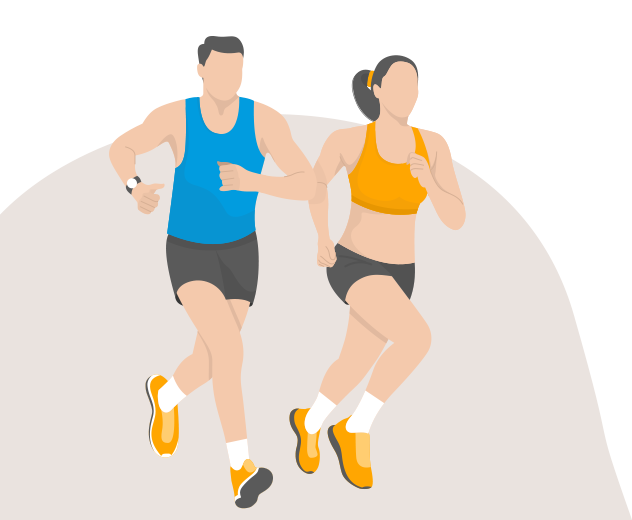Exercise Compulsion Treatment
- Expert-Led Recovery: Personalised Therapy to Address Your Unique Needs Around Excessive Exercise
- Professional Clinic: 19 Years Delivering Professional, Evidence-Based Care
- Holistic Healing: We Address Compulsive Exercise & Strengthen your Mental Resilience to Build Long-Term Recovery
EXERCISE COMPULSION TREATMENT
Reclaim Your Balance: Overcome Exercise Addiction & Embrace a Healthier You
At WeightMatters, we understand the deep and often challenging relationship with exercise. Are you feeling trapped in a cycle of relentless workouts, left wondering if today will be the day you allow yourself to rest? Do you find it difficult to enjoy physical activity without the weight of compulsiveness or guilt? You’re not alone in this struggle, and seeking balance and healing is a courageous step forward.
Excessive exercise can take a significant toll on your physical and mental health. Engaging in treatment for exercise addiction offers pathways to regain control and find balance and well-being in your daily life.

RENEWED PHYSICAL HEALTH
Restore your body’s natural capacity for healing and optimize your physical well-being.

MENTAL & EMOTIONAL CLARITY
Cultivate a positive mindset and emotional agility to develop healthier relationships with exercise and self-image.

BALANCED LIFESTYLE STRATEGIES
Implement practical tools and techniques to maintain a well-rounded and fulfilling lifestyle.

IMPROVE SOCIAL SKILLS
Enhance communication, empathy, and interpersonal skills, helping you build more meaningful connections.
Our expert team is dedicated to guiding you every step of the way. With years of experience mixed with compassionate care, we are committed to helping you rediscover joy and balance in movement, and living life.
TAKE CONTROL OF YOUR HEALTH TODAY – WE ARE HERE TO HELP
Struggling with weight and eating challenges? You don’t have to face it alone.
Our compassionate team is ready to listen, support, and guide you toward a healthier, happier life.
Book your free call now and take the first step.
OUR FEES
Our initial 20-minute consultation is free of charge, with therapy sessions starting from as little as £120, and nutrition sessions from £200.
Packages and multi-session bundles are available – we’ll guide you to the most suitable option when we speak.
Alina – Do You Resonate With Her Story?
Alina, a 25-year-old who recently relocated to London for her new job at a law firm, is experiencing significant challenges with exercise addiction. A perfectionist by nature, she channels this trait into maintaining rigid control over her routine, including her exercise regimen.
Having grown up in a fractured family environment due to her parents’ divorce, Alina learned to suppress her emotions from a young age. She has become adept at presenting a confident façade, especially in social settings where she feels vulnerable.
For Alina, controlling her body shape and weight is intimately tied to her need for emotional control and the perception others have of her. However, this has manifested into exercise compulsion, as she feels compelled to meet daily fitness goals involving specific distances, time, and calorie burn counts. If she fails to meet these self-imposed standards, agitation and anxiety rapidly set in.
Despite external appearances, Alina’s excessive exercise habits are taking a serious toll on her physical health. Persistent overtraining has led to the loss of her menstrual cycle, thinning hair, and consistently low energy levels.
These symptoms of deteriorating health have not gone unnoticed by her friends, who have grown increasingly concerned and encouraged her to seek help.
Although hesitant, Alina has reached out to a specialist therapy service focused on exercise compulsion, driven by the growing discomfort of her current lifestyle. She hopes that therapy will be both practical and supportive, providing her with the tools to navigate her emotional world and build healthier coping mechanisms.
Alina remains apprehensive, fearing therapy might force her to confront deeply buried emotions and disrupt the control she strives so hard to maintain, but she recognizes the necessity of change as her physical well-being continues to decline.
Warning Signs Of Excessive Exercise
People who search for excessive exercise treatment services are often motivated by various psychological, physical, and social factors. Here is a list of experiences and issues individuals commonly face:
Physical Injury – Concerns about repeated injuries or chronic pain caused by overtraining, prompting a need for intervention.
Loss of Control – Feeling that their exercise habits are compulsive and beyond their control, impacting their daily life and mental health.
Interference with Daily Life – Exercise habits interfere with work, relationships, or social commitments, causing distress.
Mental Health Issues – Co-occurring mental health conditions such as anxiety, depression, or eating disorders that are exacerbated by compulsive exercising.
Body Image Distortions – Obsessive focus on body image or dissatisfaction leading to excessive exercising as a maladaptive coping mechanism.
Social Isolation – Realisation that their exercise routine is causing social withdrawal or relationship problems.
Family or Friends’ Concern – Loved ones expressing worries over their health and well-being due to excessive exercise patterns.
Lack of Enjoyment – Finding that exercise is no longer enjoyable but rather a compulsive ritual that must be performed.
Diminished Performance – Experiencing a decline in athletic performance due to overtraining, injury and fatigue.
Medical Advice – Recommendations from healthcare professionals to seek treatment after identifying harmful exercise habits during medical assessments.
Nutritional Deficits – Struggles with maintaining proper nutrition and energy levels due to excessive exercise demands.
Emotional Exhaustion – Feelings of emotional burnout from trying to maintain an intense exercise regime over long periods.
Desire for Balance – A personal desire to develop a healthier, more sustainable relationship with exercise and overall well-being.
Understanding your motivations to seek support allows our therapists to create a bespoke treatment programme that addresses the specific challenges and concerns you face in relation to exercise compulsion.
Interplay Between Exercise Addiction & Eating Disorders
Exercise addiction and eating disorders have a complex relationship that can vary in intensity and manifestation across different individuals. Here’s an in-depth look at these links:
Links Between Exercise Addiction & Eating Disorders
- Shared Psychopathological Features – Individuals with exercise addiction and eating disorders often experience similar underlying psychological issues, such as poor self-esteem, body dissatisfaction, and perfectionism.
- Control Mechanism – Both exercise addiction and eating disorders may serve as a way for individuals to exert control over their lives and bodies, providing a sense of order and achievement.
- Compensatory Behavior – Excessive exercise can be a compensatory behavior for individuals with eating disorders, particularly as a means to offset calorie intake.
Connection with Specific Eating Disorders
- Anorexia Nervosa – There is a strong link between exercise addiction and anorexia nervosa, as individuals may engage in excessive exercise to lose weight or prevent weight gain.
- Bulimia Nervosa – Compensatory exercise is also common in bulimia nervosa, where individuals use excessive physical activity to mitigate the effects of binges.
- Orthorexia – Though not officially recognized as an eating disorder, orthorexia involves an obsession with healthy eating, which can be associated with compulsive exercise for health reasons.
Changing Relationship with Exercise
- Initial Enjoyment to Obligation – For those with exercise addiction, physical activity often shifts from being a source of enjoyment to a compulsory task driven by anxiety over body image or dietary habits.
- Interference with Daily Life – Over time, exercise routines may interfere with personal, academic, and professional responsibilities.
Exercise Types Most Affected
- Cardiovascular Exercise – Activities like running, cycling, and aerobics, which can be performed for extended periods, are commonly associated with exercise addiction.
- High-Intensity Workouts – Exercises such as high-intensity interval training (HIIT) can also become compulsive.
Gender Differences
- Women – More likely to develop a combination of exercise addiction and eating disorders, often driven by societal pressures to maintain a certain body image.
- Men – While less common, exercise addiction in men can be associated with a focus on muscularity and fitness, sometimes linked with eating disorders such as muscle dysmorphia.
Age Groups Affected
- Adolescents & Young Adults – These groups are particularly vulnerable due to significant physical, psychological, and social changes during this stage, compounded by societal pressures regarding appearance.
Navigating the intersection of exercise addiction and eating disorders can be challenging, yet recovery is achievable with a comprehensive multidisciplinary approach.
Medical support can stabilize well-being, while cognitive behavioral therapy and nutritional counselling fosters healthier perspectives and habits.
Together, these strategies provide hope and pave the way toward a healthier relationship with both exercise and nutrition.

EXERCISE COMPULSION
Rediscover Peace Through Healthy Movement. Heal Your Body, Renew Your Mind.
MEET DR PAULA WATSON, EXERCISE PSYCHOLOGIST
Paula shares how we work with exercise compulsion and addiction at WeightMatters.
EXERCISE COMPULSION TREATMENT
Addressing exercise compulsion and addiction effectively requires a multidisciplinary team (MDT) approach. Our comprehensive approach at WeightMatters integrates various professional services, each contributing their unique expertise to tackle the complex issues involved.
By combining therapy, nutritional guidance, psychiatric care, and private GP services, individuals receive holistic support to foster long-term recovery and well-being.

THERAPY
CBT and interpersonal therapy helps you modify unhealthy thought patterns and behaviors, and improve relationships.

EXERCISE PSYCHOLOGY
Promotes balanced physical activity and mental wellness, supporting a holistic recovery strategy.

NUTRITION
Personalised nutrition guidance restores your nutritional balance and promotes a healthy relationship with food and exercise.

PSYCHIATRY
Addressing co-occurring mental health disorders, medication management, stabilising mood and reducing compulsive tendencies.

PRIVATE GP
Regular health assessments, monitoring for complications and coordinating ongoing care within the MDT framework.
This holistic strategy not only tackles physical and mental health issues but also guides individuals toward meaningful, sustainable recovery.
Let us support you on your journey toward recovery, and help you reclaim your life. Take action today.
It’s Time To Heal.
Therapy
When treating exercise compulsion and addiction, therapists and exercise psychologists can utilize the following practical interventions:
Cognitive-Behavioral Therapy (CBT)
CBT helps individuals identify and change negative thought patterns and behaviors related to exercise. It encourages healthier attitudes toward physical activity, emphasising moderation and balance.
Mindfulness & Relaxation Techniques
Teaching mindfulness and relaxation can help individuals become more aware of their physical and emotional states. This awareness can reduce compulsive tendencies by encouraging more intentional and mindful exercise practices.
Goal Setting & Planning
Assisting clients in setting realistic and flexible exercise goals can promote a balanced approach. Creating structured exercise plans with regular rest days helps prevent overexertion and burnout.
Education on Healthy Exercise
Providing education about the physical and psychological impacts of excessive exercise encourages healthier behaviors. Clients learn how to recognize signs of overtraining and the benefits of rest and recovery.
Motivational Interviewing (MI)
MI involves a collaborative conversation style that helps clients discover their personal motivation for change. By exploring and resolving ambivalence around changing exercise behaviors, therapists assist clients in aligning their exercise habits with their broader values and long-term health goals.
We tailor our therapeutic approach to your individual needs, to support you in developing a healthier relationship with exercise and enhancing overall well-being.
Nutrition
When treating exercise compulsion and exercise addiction, dietitians and nutritional therapists can implement several practical interventions to address the nutritional and psychological aspects of these behaviors. Here are five effective strategies:
Tailored Nutrition Plan
Develop a personalized nutrition plan that meets the individual’s energy needs based on their exercise regimen. Ensuring an adequate intake of macronutrients (carbohydrates, proteins, and fats) and micronutrients (vitamins and minerals) can support recovery, muscle repair, and overall health. This plan can help prevent energy deficits that could exacerbate compulsive behaviors.
Education on Balanced Eating
Provide education about the importance of balanced eating and the risks of disordered eating associated with excessive exercise. Clarifying misconceptions about food, such as the necessity of carbohydrates and fats for energy and health, can help break harmful dietary patterns and foster a healthier relationship with food.
Mindful Eating Techniques
Introduce mindful eating practices to increase awareness of hunger and satiety cues. Encouraging individuals to be present during meals, to eat slowly, and to savor their food can help them reconnect with their body’s natural signals, reducing the compulsive urge to exercise excessively after meals.
Functional Recovery Focus
Emphasize nutrition’s role in functional recovery and performance improvement rather than weight control. By framing food as fuel that enhances performance and supports overall well-being, individuals may gain a healthier perspective on the interdependence between nutrition and exercise.
Support in Identifying Emotional Triggers
Work with clients to identify emotional triggers that lead to exercise compulsion, and provide strategies to manage these triggers in healthier ways, such as through alternative activities or coping mechanisms.
To provide optimal support, we recommend clients also work with our therapy team to address deeper emotional and psychological factors.
These interventions aim not only to ensure adequate nutrition and physical health, but also to support a healthier mental and emotional approach to eating and exercise.
Psychiatry
When treating exercise compulsion and exercise addiction, psychiatrists can use a variety of interventions that focus on addressing the psychological and emotional components of these conditions. Here are three practical strategies:
Medication Management
In some cases, medication may be prescribed to address underlying mental health issues associated with exercise addiction, such as anxiety, depression, or obsessive-compulsive disorder.
Developing Coping Skills
Psychiatrists can work with clients to develop effective coping skills to manage stress and emotions without resorting to excessive exercise. This could involve teaching relaxation techniques, mindfulness strategies, or problem-solving skills.
Family Therapy or Involvement
Engaging family members in the treatment process can be beneficial, especially if family dynamics contribute to the individual’s exercise behaviors. Involving family can help ensure that patients have a supportive network that understands and supports their treatment goals.
We recommend psychiatric support is complemented with therapy and nutritional support to provide holistic treatment for exercise compulsion and exercise addiction.
Private GP
Private GPs can play a crucial role in addressing exercise compulsion and exercise addiction. Here are three practical interventions they might use:
Comprehensive Assessment & Monitoring
Conducting a thorough assessment of the client’s physical and mental health, exploring the frequency, duration, and intensity of the exercise routines, as well as any physical symptoms or injuries resulting from overexercising. Regular monitoring of the client’s health and progress is essential to manage any medical complications arising from excessive exercise, such as cardiovascular issues or musculoskeletal injuries.
Hormonal Assessment & Management of Amenorrhea
It is important to assess hormonal health, especially in women who exhibit signs of amenorrhea (absence of menstruation) due to overexercise. This can involve evaluating levels of key hormones such as estrogen, progesterone, and others related to the menstrual cycle, which may be disrupted by excessive physical activity and low body fat.
Nutritional Support for Bone Density & Stress Fracture Prevention
Individuals experiencing exercise compulsion are at risk of low bone density and stress fractures, particularly if their nutritional intake does not meet their energy expenditure. This can be exacerbated by hormone imbalances causing amenorrhea. Private GPs can coordinate with dietitians and physiotherapists in treatment and recovery.
At WeightMatters, our Private GP can offer a hybrid shared care support with your NHS GP or other medical consultants.
Excessive Exercise Treatment – Getting Started
We believe it is important for clients to begin their journey by focusing on the area most impacting them. Some might initially start with therapy to address psychological and emotional factors, while others might opt to see a nutritionist first to rebalance their health and wellbeing.
As you progress forward through your treatment for excessive exercise, additional services can be seamlessly integrated into your plan. Our Healing Disordered Eating: Rebalance programme allows you to blend both our psychology and nutrition services for effective recovery.
Taking the step to seek treatment for exercise compulsion and exercise addiction is a powerful act of self-care. By choosing this path, you’re prioritising your overall well-being and opening the door to a balanced, fulfilling life, and a healthy relationship with exercise.
It is time to feel hopeful, heal, and start your journey to recovery.
Call us now, or book a free assessment call with our friendly client services team, who will answer any questions you have.
IT’S TIME TO START YOUR HEALING JOURNEY
You can discover our clear pricing structure.
SERVICES WE RECOMMEND FOR Exercise Compulsion TREATMENT
Here are the WeightMatters services we recommend for exercise compulsion treatment.
IF IT FEELS MORE COMFORTABLE, EMAIL US
Do you have a question about our treatment and support?
Leave your details below, and we will come back to you with a personalised response.
